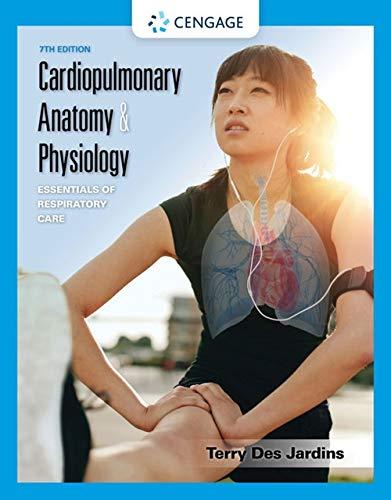down DATA ANALYSIS 1. Typical resting heart rates range from 55-100 beats per minute. What was the subject's resting heart rate? How much did the subject's heart rate increase above resting rate with exercise? What percent increase was this? Explain. alt 2. How does the subject's maximum heart rate compare with other students in the group or class? Is this what you expected? Explain. Explain- 3. Recovery time has been shown to correlate with degree of physical fitness. How does the subject's recovery rate compare to that of your classmates? Is this what you expected? page 94 4. Congestive heart failure is a condition in which the strength of contraction with each beat may be significantly reduced. For example, the ventricle may pump only half the usual volume of blood with each beat. Would you expect a person with congestive heart failure to have a faster or slower heart rate at rest? With exercise? 5. Certain medications are prescribed by medical professionals to slow a patient's heart or speed it up. If a patient complains of feeling poorly and has a heart rate of 120 beats/min, should a doctor administer a medicine to slow the rate? EXTENSIONS 1. Design an experiment to test whether duration of exercise affects recovery rate. You might have subjects exercise for 5, 10, or 15 minutes at a time and compare the time it takes for heart rate to return to baseline. 2. Design an experiment to test whether body position post-exercise affects recovery rate. What did your coach in high school tell you? STUDENT 1234 5 6 7 8 133 130 105 100 116 112 Bpm bpm May Heart Rele ILS bur bar 6pm 6pm 73 42 27 93, 54, 30, 73 Recovery time 64 S s 10|11| 12
down DATA ANALYSIS 1. Typical resting heart rates range from 55-100 beats per minute. What was the subject's resting heart rate? How much did the subject's heart rate increase above resting rate with exercise? What percent increase was this? Explain. alt 2. How does the subject's maximum heart rate compare with other students in the group or class? Is this what you expected? Explain. Explain- 3. Recovery time has been shown to correlate with degree of physical fitness. How does the subject's recovery rate compare to that of your classmates? Is this what you expected? page 94 4. Congestive heart failure is a condition in which the strength of contraction with each beat may be significantly reduced. For example, the ventricle may pump only half the usual volume of blood with each beat. Would you expect a person with congestive heart failure to have a faster or slower heart rate at rest? With exercise? 5. Certain medications are prescribed by medical professionals to slow a patient's heart or speed it up. If a patient complains of feeling poorly and has a heart rate of 120 beats/min, should a doctor administer a medicine to slow the rate? EXTENSIONS 1. Design an experiment to test whether duration of exercise affects recovery rate. You might have subjects exercise for 5, 10, or 15 minutes at a time and compare the time it takes for heart rate to return to baseline. 2. Design an experiment to test whether body position post-exercise affects recovery rate. What did your coach in high school tell you? STUDENT 1234 5 6 7 8 133 130 105 100 116 112 Bpm bpm May Heart Rele ILS bur bar 6pm 6pm 73 42 27 93, 54, 30, 73 Recovery time 64 S s 10|11| 12
Cardiopulmonary Anatomy & Physiology
7th Edition
ISBN:9781337794909
Author:Des Jardins, Terry.
Publisher:Des Jardins, Terry.
Chapter19: High Altitude And Its Effects On The Cardiopulmonary System
Section: Chapter Questions
Problem 7RQ: 7. In individuals who True ___________ False ___________
have acclimatized
to a high altitude,
an...
Related questions
Question

Transcribed Image Text:down
DATA ANALYSIS
1. Typical resting heart rates range from 55-100 beats per minute. What was the subject's resting
heart rate? How much did the subject's heart rate increase above resting rate with exercise?
What percent increase was this? Explain.
alt
2. How does the subject's maximum heart rate compare with other students in the group or class?
Is this what you expected? Explain.
Explain-
3. Recovery time has been shown to correlate with degree of physical fitness. How does the
subject's recovery rate compare to that of your classmates? Is this what you expected?
page 94
4. Congestive heart failure is a condition in which the strength of contraction with each beat may
be significantly reduced. For example, the ventricle may pump only half the usual volume of
blood with each beat. Would you expect a person with congestive heart failure to have a faster
or slower heart rate at rest? With exercise?
5. Certain medications are prescribed by medical professionals to slow a patient's heart or speed
it up. If a patient complains of feeling poorly and has a heart rate of 120 beats/min, should a
doctor administer a medicine to slow the rate?
EXTENSIONS
1. Design an experiment to test whether duration of exercise affects recovery rate. You might
have subjects exercise for 5, 10, or 15 minutes at a time and compare the time it takes for
heart rate to return to baseline.
2. Design an experiment to test whether body position post-exercise affects recovery rate. What
did your coach in high school tell you?
STUDENT
1234
5
6
7
8
133 130 105 100
116
112
Bpm
bpm
May Heart
Rele
ILS
bur bar 6pm 6pm
73 42 27
93, 54, 30, 73
Recovery
time
64
S
s
10|11|
12
Expert Solution
This question has been solved!
Explore an expertly crafted, step-by-step solution for a thorough understanding of key concepts.
Step by step
Solved in 2 steps

Recommended textbooks for you

Cardiopulmonary Anatomy & Physiology
Biology
ISBN:
9781337794909
Author:
Des Jardins, Terry.
Publisher:
Cengage Learning,

Cardiopulmonary Anatomy & Physiology
Biology
ISBN:
9781337794909
Author:
Des Jardins, Terry.
Publisher:
Cengage Learning,